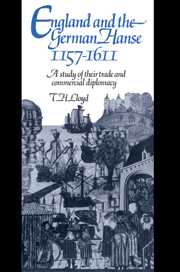Book contents
- Frontmatter
- Contents
- List of tables
- List of abbreviations
- Introduction
- 1 The winning of the Hanse franchises, 1157–1361
- 2 The English challenge, 1361–1399
- 3 Jockeying for advantage, 1400–1437
- 4 Trade, piracy, war, 1437–1474
- 5 Rivalry at Antwerp, 1474–1551
- 6 The loss of the Hanse franchises, 1551–1611
- Conclusion
- Appendix 1 Gildhall certificates
- Appendix 2 Hanse trade figures in the late fifteenth century
- Appendix 3 Elizabethan cloth exports
- Appendix 4a English cloth dyed at Hamburg, 1535–1612
- Appendix 4b English cloth forwarded from Hamburg without local handiwork 1568–1605
- Bibliography
- Index
6 - The loss of the Hanse franchises, 1551–1611
Published online by Cambridge University Press: 18 December 2009
- Frontmatter
- Contents
- List of tables
- List of abbreviations
- Introduction
- 1 The winning of the Hanse franchises, 1157–1361
- 2 The English challenge, 1361–1399
- 3 Jockeying for advantage, 1400–1437
- 4 Trade, piracy, war, 1437–1474
- 5 Rivalry at Antwerp, 1474–1551
- 6 The loss of the Hanse franchises, 1551–1611
- Conclusion
- Appendix 1 Gildhall certificates
- Appendix 2 Hanse trade figures in the late fifteenth century
- Appendix 3 Elizabethan cloth exports
- Appendix 4a English cloth dyed at Hamburg, 1535–1612
- Appendix 4b English cloth forwarded from Hamburg without local handiwork 1568–1605
- Bibliography
- Index
Summary
The dispute between the Merchant Adventurers and the Hanse merchants revolved generally around exports of cloth and in particular around the role of Antwerp as a cloth mart and a source of imports. For the first few years of Edward VI's reign the Hansards successfully defended their stake in the trade. When their rivals persuaded the government to lift the restriction on the export of unfinished cloth, on the grounds that inflation had rendered it inoperable, the Hanse merchants were granted the same favour. In the summer of 1548 they were threatened with a withdrawal of this concession and the Steelyard ordered a ban on the export of all cloth to Zeeland and Brabant. Danzig protested that this action had not been sanctioned by the towns, to which the officials replied that it was designed to rouse English clothiers to support their rights. The mere threat of a boycott seems to have been remarkably effective, since Hanse cloth exports in 1547–8 were the highest ever yet recorded. There was no more talk of discrimination and Hanse cloth exports continued their upward progress. In April 1550 came the first hint of the fact that Antwerp could not soak up an unlimited amount of English cloth. A group of clothiers complained that the Merchant Adventurers had abated prices, so that they were unable to dispose of their products without the loss of 20s on each piece.
- Type
- Chapter
- Information
- England and the German Hanse, 1157–1611A Study of their Trade and Commercial Diplomacy, pp. 292 - 362Publisher: Cambridge University PressPrint publication year: 1991
- 1
- Cited by



